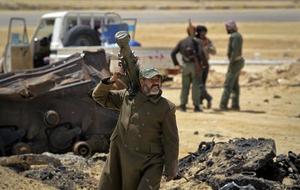Shoulder-fired missilesWhere have Libya's antiaircraft missiles gone?
U.S. government officials fear that more portable anti-aircraft missiles may have slipped into the wrong hands or been sold in the black market after rebels in Libya raided one of Colonel Muammer el Qaddafi’s munitions depots; late last month rebels captured the city of Ga’a which contained an ammunition depot that housed Man-Portable Air-Defense Systems, lightweight surface to air missiles known as Manpads; in the ensuing chaos, the depot was raided and crates of weapons disappeared with no record of where they went

Libyan rebel with shoulder-fired missile // Source: agelioforos.gr
U.S. government officials fear that more portable anti-aircraft missiles may have slipped into the wrong hands or been sold in the black market after rebels in Libya raided one of Colonel Muammer el Qaddafi’s munitions depots.
Late last month rebels captured the city of Ga’a which contained an ammunition depot that housed Man-Portable Air-Defense Systems, lightweight surface to air missiles known as Manpads. In the ensuing chaos, the depot was raided and crates of weapons disappeared with no record of where they went.
In an informal search, forty-three empty crates that had once held Russian SA-7s, an early version of Manpads, were found empty in a large pile suggesting that they had been unpacked and loaded on to vehicles.
American officials worry that these weapons could have fallen into the hands of smugglers, and senior officials in Chad and Algeria, which borders Libya, have publicly stated that after other government munitions dumps fell, Manpads from Libya were seen passing through their borders into the hands of al Qaeda in the Islamic Maghreb which operates in North Africa.
At this time it is unclear who has been taking the Manpads as the loosely organized rebels have no record keeping system for captured munitions depots and the facilities remain loosely guarded.
“The rebels came from all over the western mountains, and they just took what they wanted,” said Riyad, who supervises the raided depot in Ga’a with a small contingent of guards.
No evidence suggests that rebels are directly involved in trafficking, and rebel leaders say that if fighters took the missiles, it was for use in battle.
The surface to air missiles are designed to hit aircraft and currently only NATO planes are flying above Libya. Colonel Juma Ibrahim, a rebel military spokesman, explained that the poorly trained forces, consisting primarily of civilians, may have taken the missiles by accident thinking they could be used against vehicles on the ground.
“They think, ‘I have this missile and I will not use it against aircraft, I will use it against a tank,’” said Colonel Ibrahim.
Colonel Mukhtar Farnana, the rebel military commander in western Libya, added that his forces have been forbidden from bringing any missiles that can be used against planes to the front lines. “Our fighters are forbidden from using them,” he said.
To help secure these dangerous missilesand prevent more missiles from being carted off to other countries and sold on the black market, the U.S. government has donated $1.5 million to the Mines Advisory Group and the Swiss Foundation for Mine Action.
U.S officials have also sent teams to Libya’s neighboring countries including Algeria, Mali, and Niger to seek their assistance in preventing these weapons from being trafficked and how to identify the missiles if smugglers are trying to transport them.
Andrew J. Shapiro, the assistant secretary of state for political-military affairs, said the unsecured missiles in Libya are “one of the things that keep me up at night.”
Speaking off the record to the New York Times, American officials say they have repeatedly asked the National Transitional Council, the de facto rebel authority, to secure the missiles and prevent any more from being taken.
Colonel Qaddafi is believed to have as many as 20,000 Manpads in his possession, but many remain under government control while others have been used in the recent fighting which suggests that the number of unaccounted Manpads is relatively small.
